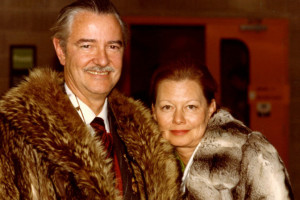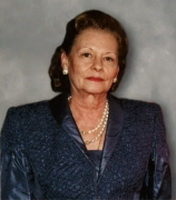Re Ian Bremmer 'Could third-party candidates upend the 2024 US election?' 3 April The current political movement in the USA…
Liliane Stewart R.I.P.
Written by Diana Thebaud Nicholson // May 14, 2014 // Montreal // Comments Off on Liliane Stewart R.I.P.
Life and legacy of pioneering philanthropist Liliane Stewart
12 May
Opinion: Liliane Stewart was an innovator in philanthropy
By Bruce McNiven, Special to The Gazette
Only two weeks ago, at a reception marking David’s passing, Liliane made a brief appearance. Very frail, but with characteristic uncomplaining courage and grace, she invited old friends to raise a glass to him — a fitting adieu, but too modest. Her own efforts leave a legacy that’s tangible, visible, intellectual and esthetic.
Sir Christopher Wren’s grave in St Paul’s Cathedral in London bears the well-known inscription in Latin: “Reader, if you require a monument, look around you.” These words apply equally to Macdonald and his heirs as benefactors, especially David and Liliane Stewart. Lest we forget.
Liliane Stewart died May 3 in her 86th year. With her late husband, David Macdonald Stewart, and his family, she made enormous contributions to culture and heritage in Montreal that are now so embedded in its fabric, we almost take them for granted.
Her death marks the end of an era and of a style embodying the best traditions of philanthropy carried on for more than a century by Sir William Macdonald and the Stewarts. In 1917, Macdonald, one of the greatest builders of McGill University, left his tobacco business and his fortune to two Stewart brothers who had long worked for him. Out of this legacy and over decades, Walter Stewart and his wife, May, continued to fund Macdonald College at McGill, and made new endowments to life sciences and medicine at the university.
Their son David sold Macdonald Tobacco in 1973, and with his wife, Liliane, converted the proceeds into the endowment of the Macdonald Stewart Foundation. They continued to support McGill, but they also began hands-on funding. They became personally involved, sometimes on a daily basis, in projects that were occasionally idiosyncratic but always serious and innovative. Most notably, they were determined to give freely across the French/English divisions in the city, which had been sapping Montreal’s native and historical capacity as a place open to variety and innovation.
She gave away millions. Liliane Stewart, philanthropist 1928-2014
Par Alan Hustak le 3 mai 2014 (with updates 5 May)
(The Métropolitain) Liliane M. Stewart, the Montreal tobacco heiress who endowed and supported several Montreal museums, including the Montreal Museum of Fine Arts, the Château Ramezay the Stewart Museum on Île Sainte-Hélène, as well as a number of hospitals died early Saturday, May 3. She was 85. She was an intensely private, sometimes difficult woman, who carried on and expanded her husband’s philanthropic works. Mrs. Stewart refused to talk about herself or answer personal questions. Once, when asked to furnish biographical material to a journalist she declined. “Me, I am me,” she said. “That’s all you need to know. I am a very private person.”
 She was in fact Liliane Spengler, one of two daughters in a Czech engineer’s family. Her mother was Italian. She was born in Cairo, Sept. 2, 1928. Her formative years were spent with her sister in Egypt where they were educated in French ‘it was paradise,” she confided, we had the best opera, the best French theatre. And the museums, they were filled with Egyptian history.” Mrs. Stewart was fluent in six languages Arabic, French, Italian, Spanish, Checz and English. In 1954 she married a New York import dealer Bob Rubin. She was 38 years old when their daughter, Roberta was born. Her first husband was killed in a car accident shortly afterwards and she went to work to support her family. In 1967 she married David. M. Stewart, the Montreal tobacco magnate who had five children of his own and had been one of her husband’s clients. In 1973 Mr. Stewart sold the tobacco company for $70-million and created the Macdonald Stewart Foundation. Liliane Stewart became the foundation’s vice-president.
She was in fact Liliane Spengler, one of two daughters in a Czech engineer’s family. Her mother was Italian. She was born in Cairo, Sept. 2, 1928. Her formative years were spent with her sister in Egypt where they were educated in French ‘it was paradise,” she confided, we had the best opera, the best French theatre. And the museums, they were filled with Egyptian history.” Mrs. Stewart was fluent in six languages Arabic, French, Italian, Spanish, Checz and English. In 1954 she married a New York import dealer Bob Rubin. She was 38 years old when their daughter, Roberta was born. Her first husband was killed in a car accident shortly afterwards and she went to work to support her family. In 1967 she married David. M. Stewart, the Montreal tobacco magnate who had five children of his own and had been one of her husband’s clients. In 1973 Mr. Stewart sold the tobacco company for $70-million and created the Macdonald Stewart Foundation. Liliane Stewart became the foundation’s vice-president.
“They were a perfect complement to each other,” said Bruce Bolton, executive director of the Macdonald Stewart Foundation, “He was the macro manager She was the micro manager. She was the artist. She was exposed to and appreciated quality. He was the dreamer ”
Initially, the Foundation bought the historic Forget mansion, a Victorian mansion on Sherbrooke St. in the city’s Square Mile. They restored it and opened the Musée des Arts Decoratifs de Montréal in the Château Dufresne and then bought and restored the Manoir Jacques Cartier in St. Malo, France. It also supported the Château Ramezay Museum and made substantial contributions to the Montreal Museum of Fine Arts and other cultural, medical and educational institutions, especially Macdonald College where Mrs. Stewart was took an interest in youthful endeavours.
After David M. Stewart died in 1984, Mrs. Stewart became Foundation president, sat on the boards of four museums, and under her direction donated more than $100-million to various societies, associations and museums.
“Another page of Montreal’s history has been turned,” said Guy Ducharme, the director of public affairs of the Macdonald Stewart Foundation. “Few people have contributed as much to this city as she did. “She was one of those people who believed, like her late husband David, that if she didn’t do it herself, things wouldn’t ever get done. When she was challenged, she was always right. She was the artist who understood quality, and she was the one who made her husband the man of the world that he became Until recently she travelled extensively, making three or four trips each year to Europe. During the 1980s Stewart was embroiled in a nasty public family feud when her step-daughter, Victoria, an employee of the Stewart Museum for several years, claimed that her father’s trust was being mismanaged. A decade later, Victoria Stewart was let go. In 1999 Liliane Stewart donated her decorative arts collection, worth an estimated $15-million to the Montreal Museum of Fine Arts. In recognition of the gift, one of the wings of the museum was renamed the Liliane and David M. Stewart Pavilion in 2001.
She was a marksman, and a keen supporter and Life Governor of the Dominion of Canada Rifle Association which was opposed to gun control. “There are things you can do with a gun that are not deadly,” she explained. Mrs. Stewart was appointed Honorary Colonel of the Queen’s York Rangers in 1984, and was honorary colonel of the Compagnie franche de la Marine and the Old 78th Fraser Highlanders.
She served on McGill University’s Board of Governors, and was awarded the French government’s highest cultural order when she was made an Officier des Arts et des Lettres in 1988 and invested as Officier de l’Ordre national du Québec in 1989. She became a Canadian citizen in 2006 and was made an Officer of the Order of Canada in 2007.
Her only daughter from her first marriage, Roberta, died in 1983.
The funeral will be held at Notre-Dame Basilica on the 13th of May at 11 o’clock
14 May
Phyllis Lambert: Liliane and David Stewart will inspire future generations
(Montreal Gazette) Ever since her death last week and notably at her funeral Tuesday in Old Montreal, we have had both the glorious and sad privilege of celebrating the life of Liliane Stewart. Madame Stewart remains in our minds and hearts as an extraordinary woman who gave so much to all of us.
Good fortune brought me into the orbit of Liliane and her husband, David, in the early 1970s, when I had just returned to Montreal. They were intense, and concerned about the degraded state of Montreal in these years when our built patrimony was being wantonly destroyed.
I have a strong memory of our first real conversation, while driving back to the city from their riverside Pointe Claire home. They had recently established the Macdonald Stewart Foundation, and our talk was about museums, the museums we wanted to create in Montreal — and did create, with David dreaming, and Liliane’s down-to-earth approach, making them realizable. We were in love with what could be done, and in love with each other.
Some museums were, of course, already established. I remember the energy and enthusiasm with which Liliane persuaded other museums to lend objects to the Stewart Museum, on Île Sainte-Hélène, for such exhibitions as Madame de Pompadour et la floraison des arts; and with special fervour, surely thinking of David, the exhibition titled Joséphine, The Great Love of Napoleon. The collection of the Museum of Decorative Arts was her special passion — this seminal collection of design objects of the 20th century that we live with.
We know that Liliane assumed David’s work after his most untimely death. She had the perspicacity to engage the best advisers to strengthen existing museums and those she had worked hard to create, and to help with the merger of cultural institutions. Liliane brought the rich collection of the Museum of Decorative Arts to the Musée des beaux-arts de Montréal. This was a major donation. And last year, she saw through the integration of the Stewart Museum with the McCord Museum.
Liliane participated closely with David in the foundations and organizations they formed, which so generously supported issues of agriculture, historical societies, education, medical research as well the arts. Liliane was never just superficially involved, never solely a titular member. In fact, I suspect that it was her drive, organizational abilities and attention to detail, while never putting herself forward, that were ultimately responsible for many of the accomplishments of the Macdonald Stewart Foundation.
There was no bureaucracy. On a visit to the Macdonald Stewart Foundation, one would huddle with Liliane among a pile of books and objects in one room, clearing a path to a seat or a table. There were no formal notes, no minutes of meetings. I will also remember how much fun it was to be in her apartment; the contemporary furniture reminded her of the interesting environment she grew up in; there were also her paintings, and her collection of turtles, dolls and teddy bears from all over the world. I remember quiet, thoughtful discussions of dreams and desires.
Liliane’s support extended broadly. She was probably the least self-centered person I have known. She was not modest — she knew her worth, but never drew attention to herself. Her desire was to make others shine. These qualities, her moral generosity and her wit, little known publicly, were cherished by those close to her. Liliane was a great and loving friend. Personally, I will miss her terribly.
I am sure that no one would be surprised to learn that, marking the anniversary last month of David’s departure, Liliane was reminded that for 30 years now, he has not been with us.
“Has it been that long, 30 years?” she cried. “Then what am I doing here? I want to be with him.”
Were they not always together? I see the magnificent romance of Liliane and David Stewart as a model of selfless impassioned engagement in society. They form a constellation that will inspire future generations.
Phyllis Lambert is Founding Director Emeritus of Montreal’s Canadian Centre for Architecture.
© Copyright (c) The Montreal Gazette
Some background
William Christopher Macdonald
A lifelong bachelor, Macdonald bequeathed his tobacco company to Walter and Howard Stewart, the two sons of company manager David Stewart. The company remained in the Stewart family until 1973 when David M. Stewart (1920–1984) sold it to the American tobacco giant R. J. Reynolds Tobacco Company and used the proceeds to establish the Macdonald Stewart Foundation for charitable causes. Macdonald and/or the Macdonald Stewart Foundation funded the following facilities at McGill University:
Macdonald Campus – until 1971 known as Macdonald College.
Macdonald Engineering Building
Macdonald-Harrington Building
Macdonald-Stewart Library Building
Stewart Biological Sciences Building
Macdonald Park (The land on which several buildings including the Molson Stadium, McConnell Arena, Currie Gymnasium and upper campus residences are located)
Macdonald also founded and funded the Macdonald Institute at the University of Guelph,[1] as well as the Macdonald Hall women’s residence



